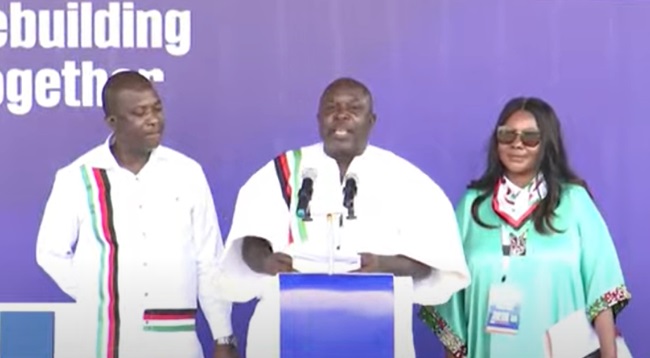The opposition National Democratic Congress (NDC) has lauded what it sees as a “reset” within the New Patriotic Party (NPP), describing the development as timely and necessary for Ghana’s collective progress.
Speaking at the NPP’s National Delegates Conference held in Accra on Saturday, July 19, Ludwig Hlodze, Director of Logistics and Protocol for the NDC, said the NPP’s renewed introspection following its 2024 electoral defeat signals a move towards constructive politics—one that supports President John Dramani Mahama’s vision of national rebuilding.
“The country Ghana is going through a reset process. It is very important that we as political parties reset our ideas, policies, and programmes,” Mr Hlodze remarked.
He continued, “That is why we are happy that the biggest opposition party in our country is doing exactly that—to reset and play their role with constructive criticism to support the nation builder, John Mahama, to rebuild the Ghana we all want.”
Held under the theme “Rebuilding Together with Our Values,” the NPP’s conference marks a pivotal moment for the party as it seeks to reform and reposition itself after losing power in last year’s general election. Over 5,500 delegates gathered to consider more than 50 proposed constitutional amendments aimed at strengthening internal democracy and broadening participation.
Among the key proposals is a major reform of the party’s presidential nomination process. Senior party figures Peter Mac Manu and Evans Nimako have proposed scrapping Article 13 (1)(9) of the NPP constitution, which establishes a Special Electoral College for presidential primaries.
They argue that the College’s composition is unrepresentative and unnecessarily delays the selection process, failing in its aim of reducing internal friction.
The amendment instead advocates for a significantly expanded electoral college to include the National Council, National Executive Committee, Regional and Constituency Executives, polling station and electoral area coordinators, Members of Parliament, card-bearing ministers and deputy ministers, Metropolitan, Municipal and District Chief Executives (MMDCEs), and past national officers.
Also proposed are voting rights for TESCON representatives from each recognised tertiary institution, three representatives each from the party’s special organs, and delegates from all recognised external branches.
Observers say the amendments, if adopted, would mark one of the most significant structural overhauls in the NPP’s history and could influence how other political parties structure internal elections.

